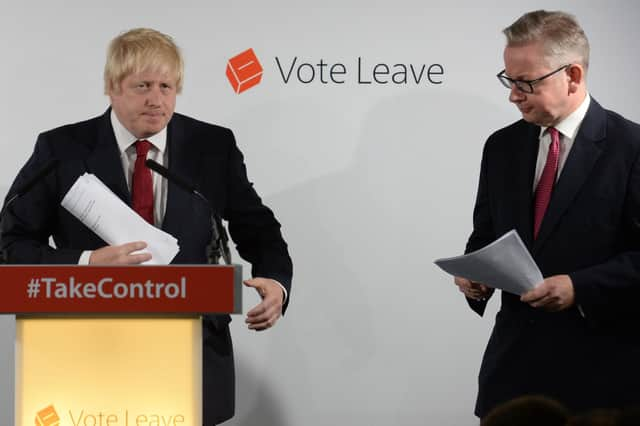It will be hard for the new prime minister to back out of the Northern Ireland Protocol bill


Or at least, he’s going. Boris Johnson may be planning to stick around until the somewhat time-consuming process of selecting a new Conservative leader is complete, but he has at least announced his resignation.
A change of leader potentially has huge implications for government policy across a huge range of areas. We have already seen clashes between Tories who favour a balanced, fiscally-responsible approach to the public finances and those who want to prioritise spending or tax cuts.
Advertisement
Hide AdAdvertisement
Hide AdBut one of the biggest challenges facing any incoming prime minister will be the constitution and the future of the United Kingdom.
The most immediate and pressing question will be the future of the Northern Ireland Protocol (NIP) Bill, which is currently working its way through Parliament.
After a year of dithering over Article 16, this represents the most concrete commitment the government has yet given to trying to safeguard Ulster’s proper place as a full participant in the Union.
Given how long it took to secure this step, many unionists will be understandably concerned that a change at the top could see London start backpedalling once again. But although this can’t be ruled out entirely, the dynamics of a leadership contest probably militate against it.
Advertisement
Hide AdAdvertisement
Hide AdAfter all, one reason we ended up with the bill in the first place is because the prime minister decided to entrust the negotiations with Brussels to Liz Truss, whose ambitions to lead the party are well-known.
Perhaps he expected to be handing a poisoned chalice to a potential rival, hoping she’d absorb the blame for a climbdown. He reportedly even lined up with Rishi Sunak and Michael Gove, the man who was meant to be in charge of Union policy, against Truss before the bill was tabled.
But that isn’t how it panned out. Instead, the foreign secretary had every incentive to take a tough line with Brussels – and Johnson couldn’t afford to be outflanked.
It is difficult to see how that same logic won’t play out in the upcoming contest. There will certainly be candidates on the (somewhat ironically-named) ‘One Nation’ wing who would probably not have tabled the NIP Bill and would prefer some sort of reset with the EU.
Advertisement
Hide AdAdvertisement
Hide AdBut it will be incredibly difficult for any candidate to back out. In the early stages of a contest, the best-organised Conservative MPs are outfits such as the European Research Group and the 70-strong pro-UK caucus, the Conservative Union Research Unit.
In comparison, those disposed towards a more conciliatory approach are less habituated to factional organising or rebellion – hence why the NIP Bill passed its second reading without even Theresa May voting against it.
Different candidates might be more or less disposed towards finding a compromise. But given that now involves pulling a high-profile legislation, the threshold for any deal is likely much higher than it was.
Of course, Northern Ireland isn’t the only issue putting the Union front and centre in this leadership campaign – there is also the question of Nicola Sturgeon’s latest push for a referendum on Scottish independence.
Advertisement
Hide AdAdvertisement
Hide AdIn terms of the immediate politics, this is probably quite simple. Few of the men and women vying to lead the Tories are going to differ from Johnson on refusing a referendum in the immediate future.
But there remains the question of the government’s longer-term strategy.
Under the current prime minister, there hasn’t really been one. Michael Gove was nominally in charge of it, until he was sacked, but frequently found himself at loggerheads with other members of the Cabinet over issues such as legislative consent motions or how and when to use the UK Internal Market Act.
And Gove only won control of Union policy after the collapse of the Downing Street Union Unit after two heads in quick succession were forced out during one of the bouts of court intrigue which too-frequently wracked Number 10 over the past few years.
Advertisement
Hide AdAdvertisement
Hide AdThe Conservatives can’t afford to put their head in the sands on this. If they repeat the complacency they showed after seeing off devolution in 1979, they risk history repeating itself and getting once again outflanked by a Labour Party committed to even more dangerous constitutional tinkering.
Unfortunately, this whole process will once again highlight how unhappily marginalised Northern Ireland is by the fact that the major parties don’t properly organise here. Whilst local Tory members will get a vote in the final round on the same terms as those on the mainland, there will be no MPs or MLAs to advocate for Ulster and its interests during the earlier stages.
Unionists have good historic justification for a wary approach to the Conservative Party, of course. But it is surely apparent now that this rupture between them and the country’s principal unionist party has done the Union no long-term good.
Whoever the next leader is, they need to recognise that there is more to safeguarding the Ulster’s place in the UK than amending the protocol; they need to work out how the Conservatives can bring Northern Irish voices back into the heart of government at Westminster.
l Henry Hill is deputy editor of the website ConservativeHome